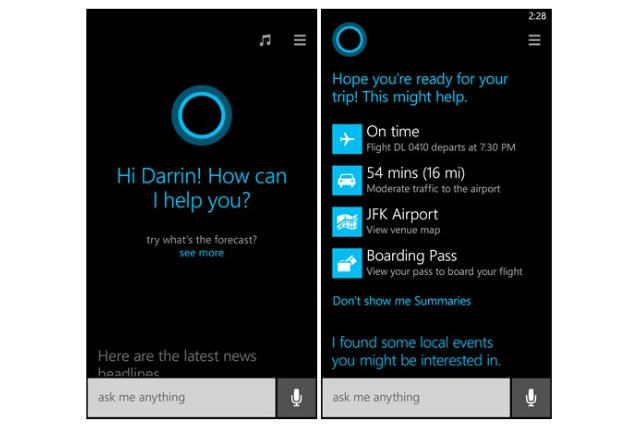
Microsoft's group program manager for Cortana, Marcus Ash, told Marketing that the voice assistant would eventually collate information about users' personal interests and share them with external apps - with user permission.
Cortana already allows developers to "deep link" to apps, meaning users can open apps and display specific content through voice commands. Ash sees this moving one step further, with voice assistants actively pointing to relevant apps, something brands could take advantage of.
"Once we have this collection of data – home, work, who’s most important to you, what type of content you think is most important – and the person gives permission for Cortana to share that with key targeted apps, that’s...information that apps can and should use," he said, speaking at Social Media Week in London.
Apps are in a much better position to take that data, with permission, and serve up interesting content
But Ash does not believe Cortana and other voice assistants will directly threaten traditional search by serving up targeted ads. They could, however, still circumvent the likes of Google by directing users to apps.
Ash said: "Apps are in a much better position to take that data, with permission, and serve up interesting content.
"It’s going to be about the discovery process. We really want to make apps the first-class citizens of Cortana, because we think there’s value to our customers and we think there’s value to our app ecosystem.
"We can help people discover your app. If [a user] asks a question about doing something interesting that’s app-related, we could say, 'Hey there’s an app that could help you with that, would you like me to share your profile to do richer and more interesting things for you?'. We could broker that connection. That's the future of these assistants."
For now, however, voice assistants remain one to watch until consumers become more comfortable with the technology. Microsoft has already ruled out ads on Cortana, and the vast majority of mobile users still rely on typed rather than spoken searches.
Ash said the proportion had shifted however after Cortana's release, with voice now accounting for 20% of Bing searches. Windows Phone, the only platform on which Cortana runs, itself remains a niche product, accounting for a tiny 3% of the smartphone market, according to first-quarter statistics from Canalys.
How Microsoft built Cortana
Ash revealed that some of Cortana's responses are scripted by a team of writers based in the US, UK and China, who determine which references and jokes are relevant to the local market. A joke or cultural reference that is relevant in the US, says Ash, may not do so well overseas.
"When you have personality, you’re much more forgiving of mistakes," he said of Cortana's witticisms. "Even now when we’re looking at Cortana, people use the word ‘mistake’ instead of ‘error’. When you think of a software programme, you think ‘error’. That’s an interesting lesson."
"By giving the system more personality, people are much more forgiving, though they expect you to get it right eventually."
Trust is a key theme with Cortana. Reviewers have noted that Cortana is more "intimate" than Siri and Google Now, asking personal questions to determine the user's age and even their marital status.
"There’s so much personal information on the phone, it’s an intimate personal device," said Ash. "Think about a personal assistant – that information is the first thing she’d want to know. We thought about that with Cortana."
Microsoft actually interviewed personal assistants to help determine Cortana's functions, according to Ash.
The company is also trying to take user privacy seriously, something that will be key to user uptake.
"We felt there's a fine line between creepy and magic," he said. "It's early for us and we're trying to strike the appropriate balance."



.jpg)
.jpeg)
